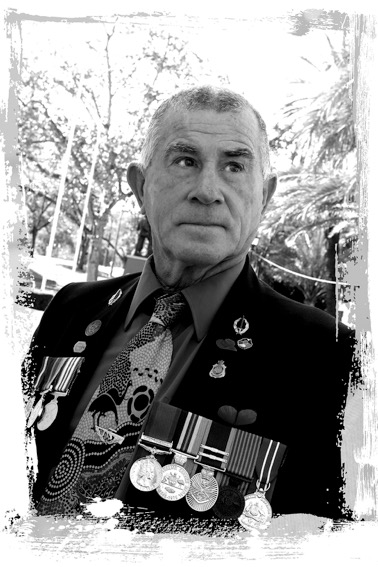
Jeff McCormack
Aboriginal
Sergeant
3rd Battalion Royal Australian Regiment
Australian Infantry Corps
Australian Army
Medals
General Service Medal 1962 with clasp Malay Peninsula
Australian Service Medal 1945-75
Reserve Force Medal with 2 clasps
National Medal
Australian Defence Medal
I was born on 3 February 1944 in Adelaide, but there was a lot of fighting because dad was never around, and mum would always be looking after us. At school, I used to get quite dark in summer and the kids at school would call me ‘wog’ thinking I was an Italian or a Greek, but it wasn’t until I was in my 60s that I found out that I was Aboriginal. I was working 44 hours a week earning three guineas, which I gave mum so that we had food on the table.
My older brother had joined the army in 1965 and served in Vietnam, and I felt motivated to join by the steady stream of Australian soldiers I saw coming home from the war, dead or badly injured, and I felt I just had to do my bit. I enlisted in the Army in 1966 and was posted to the infantry in the 3rd Battalion Royal Australian Regiment. We were deployed to Malaysia from 1973 to 1974 during a resurgence of armed conflict by the Communist insurgents. Malaysia was supposed to be a peace-keeping mission while the Vietnam War was still going on, but the environment in Malaysia was still very hostile. After Malaysia, I became an instructor for recruit and promotion courses at several locations across Australia, including Larrakeyah Barracks, Northern Territory; Army Recruit Training Centre, Kapooka NSW; 2 Training Group, Ingleburn NSW; and 4 Training Group in Adelaide. I’ve done 30 years in the military, I was probably one of the oldest platoon sergeants. I didn’t realise that being an instructor would have an impact on me, but it did. The simulated scenarios we created in training were often too real and I was diagnosed with Post Traumatic Stress Disorder. But, I am proud that during my time in the Army, I trained well over 3,000 soldiers. My sons have also served. One of my sons is still serving; he’s just transferred to the Air Force after eight years in the Army. My other son served four years, but he’s out now.
Everyone knew there was something strange about our family because my mother was dark, my aunties were all dark. One day, in the early 2000s, after a family funeral, an Aunty handed me this little photo of a black Aboriginal man and said, ‘Jeffrey, I want you to keep this. This is a photo of your grandfather.’ I looked at the man in the photo and I could see myself in his face, and I was so happy, so elated. I couldn’t wait to get home to tell my family, this is your grandfather, this is your great-grandfather. But mum still denied it for years until one day when we were watching ‘Rabbit Proof Fence’ with my children, she said “that is why I’ve never ever admitted it to you children because I was scared you’d be taken away.” We’ve missed out on a lot but we are learning now. My kids are all on their own journey now, they’re talking their own language and trying to teach their kids. I go to a lot of the schools talking about stolen generations and reconciliation. My wife and I are foster carers to a number of children from troubled circumstances, both Indigenous and non-indigenous.
But there are Aboriginal people that fought for Australia and never came back. There are memorials to all soldiers that fought in wars overseas, but none to those Aboriginal warriors who fought the British during colonisation. Jandamarra, Yagan, Dundalli and Pemulwuy, all fought for their country here on Australian soil. They are our heroes. They never get recognised for their service in defending our country.